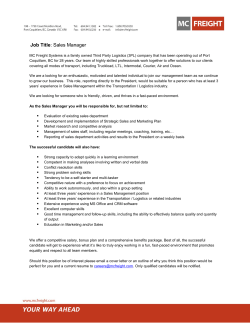
LOG101-PRINCIPLES OF LOGISTICS
1 Dr. Burcu Özçam ADIVAR email Office Phone Office hours Web address : burcu.ozcam@ieu.edu.tr : Room 811, C Block : Internal 8510, 02324888510 :Monday 12:30-15:30 Wednesday 15:30-17:30 : http://homes.ieu.edu.tr/~bozcam/ 2 Dr. Öznur YURT email Office Phone Office hours Web address : oznur.yurt@ieu.edu.tr : Room 321, A Block : Internal 8460, 02324888460 : Thursday 09:30-12:30 Friday 12:30-15:30 : http://homes.ieu.edu.tr/~oyurt/ 3 Teaching Assistants E-mail address and Phone Office Hours Room Cansu Yıldırım cansu.yildirim@ieu.edu.tr 02324889874 Tuesday 9.30-12.30 C Blok 9. Kat Birsen Yılmaz birsen.yilmaz@ieu.edu.tr 02324889875 Tuesday 9.30-12.30 C Blok 9. Kat 4 *What is logistics? *What is logistics management? 5 LOGISTICS 6 LOGISTICS 7 LOGISTICS and SCM 8 LOGISTICS 9 10 Drawing of a hatchless containership. Courtesy CIGNA Corporation, Ports of the World, 15th edition. 11 12 13 Course Objectives Develop an understanding of the role of logistics in a market-oriented society Examine the major functions of logistics Provide an opportunity for comprehensive analysis and discussion of key contemporary issues and problems in logistics and supply chain management Examine the details of planning and control processes in logistics management 14 Course Learning Outcomes Having completed the course, students should be able, to understand the principles of logistics management to understand the logistics role in the economy and the organization to be aware of the distinction between the concepts of supply chain and logistics to use the related concepts/terminology 15 Course Learning Outcomes to combine their theoretical knowledge with practical knowledge to understand the general concepts of customer service to understand the general applications of logistics information systems to understand and to use the concepts of inventory management and material management to understand and develop decision strategies in transportation and traffic management 16 Week 1 WEEKLY SUBJECTS Subjects Introduction Concept of Logistics Management and Evolution of Logistics Related Preparation 3 Logistics Role in the Economy and the Organization Textbook, Chapter 4 4 5 6 Concept of Supply Chain Management Customer Service Customer Service MIDTERM I Order Processing and Logistics Information Systems (LIS) Textbook, Chapter 5 Textbook, Chapter 7 Textbook, Chapter 7 2 7 Contemporary Logistics (Textbook), Chapter 1 Textbook, Chapter 2&7 8 Order Processing and Logistics Information Systems (LIS) Textbook, Chapter 2&7 9 10 11 12 13 14 15 Inventory Management Inventory Management MIDTERM II Materials Management Materials Management Study Set Overview of the course Textbook, Chapter 8 Textbook, Chapter 8 Textbook, Chapter 11 Textbook, Chapter 11 17 COURSE NOTES -Assignments and class discussions include; assigned cases, academic articles and/or other assignments as well as the accompanying discussion of these assignments in class. -Details about each assignment will be given to the students at least one week prior to due date. 18 Other Sources Stock R. James, Lambert M. Douglas, “Strategic Logistics Management”, 4th Ed., Int. Ed.-2001, McGraw-Hill Irwin, ISBN 0256-13687-4. Lambert M. Douglas, Stock R. James, Ellram M. Lisa, “Fundamentals of Logistics Management”, 1998, Irwin/McGrawHill Publishing. Ballou R. H. "Business Logistics/Supply Chain Management ", Pearson Education, Inc., Upper Saddle River, New Jersey, 5th Edition, 2004, ISBN 0131230107 S. Chopra – P. Meindl: Supply Chain Management, Strategy, Planning and Operation, Pearson Education Inc., 2004 Coyle, Bardi, and Langley Jr., The Management of Business Logistics, SouthWestern/Thomson Learning ISBN 0324007515 19 Web References: http://logistics.about.com/industry/logistics/mbody.htm http://www.cips.org/ http://www.clm1.org/ http://members.eunet.at/ifpmm/i_vision.html http://www.warehouselogistics.org/ http://www.sole.org/ http://www.lmi.org/ http://www.supply-chain.org/ http://www.tli.gatech.edu/ 20 EVALUATION SYSTEM Semester requirements Number Attendance Percentage of grade 5 Homework assignments and Cases 5 25 Midterms 2 40 Final 1 30 21 COURSE POLICIES Attendance is required at all times. Any evidence of cheating, fabrication, facilitating academic dishonesty or plagiarism will be reported to the Dean of students for appropriate disciplinary action and you will receive a failing grade for the assignment (0). Please refrain from unnecessary conversation during class. During class cell phones must be turned off. Please refrain from text messaging during class. Please refrain from emailing or surfing the web using laptop computers during class. All of the assignments and exams must be completed. Otherwise you will not receive a passing grade. 22 CONGRATULATIONS! NOW, YOU ARE A COLLEGE STUDENT 26 YOUR RESPONSIBILITIES 1. 2. 3. Read course syllabus from front to back before asking the instructor about class policies. If the answer isn't in the syllabus, the instructor will be happy to talk with you. Know the class policies in the syllabus. Attend class. You are responsible for all announcements made in class, in labs, and on class web sites. Saturday classes will be announced in advance. Come to class on time. Treat each class as your job-consistently late arrivals disrupt the class, and, of course, make you miss the most important part of class-- the first 5-10 minutes when announcements are made and questions are answered. If you are late for more than 15 minutes, please do not attempt to enter. 27 YOUR RESPONSIBILITIES 4. If you have any problems with getting work done, with exam schedules, or anything that requires you to meet a deadline, it is your responsibility to notify the instructor in advance. 5. Know when and where examinations are given and be there. 6. Turn in all homework. Start assignments as soon as they are assigned. Problems with printers, computers, disk failures, etc., are not acceptable excuses for not turning in your homework on time. Late submissions will not be accepted. 28 YOUR RESPONSIBILITIES 7. Check your grades when they are posted or returned to you. Any errors must be reported as soon as possible, usually within one week. 8. Make certain that your performance merits the grade you want. 9. Find your instructor's office early in the semester and know his/her office hours. Know who your lab assistants are and what their hours are. 10. Any single incident of dishonesty (on an exam or on repeated homework assignments) can result in penalties ranging from course failure to removal actions through the Dean's office. 29 YOUR RESPONSIBILITIES 11. Save all of your graded work until the end of the semester. Keep the electronic source files and diskettes. Instructors make errors in the recording of grades and calculation of final grades. The errors are simple to correct if you present the instructor with the graded assignment. 12. Backup electronic work frequently on CD and maintain backup files on separate diskettes. No one will allways be able fix your disk if it malfunctions or backup files for you. Take malfunctioning diskettes to the Help Desk. Be aware of University policies on Computers & Software. 30 YOUR RESPONSIBILITIES 14. Read your email at least every other day. This is the quickest and easiest way for an instructor to communicate with a large group of students and for individual students to communicate with the instructor. 15. Identify any disability which may negatively impact your performance in any class as early in the semester as possible. Speak to the instructor in private. 16. Please take notes during the course. The slides will be uploaded to the lecturer’s web site after the lectures. 17. Know university policies on subjects such as withdrawal and know Student Action Deadlines. 31 GOOD LUCK!! 32 33
© Copyright 2025
















